专题13:句子成分 & 句子种类 & 基本句型【课件】-备战2024中考英语二轮复习语法精练(全国通用)
文档属性
| 名称 | 专题13:句子成分 & 句子种类 & 基本句型【课件】-备战2024中考英语二轮复习语法精练(全国通用) | 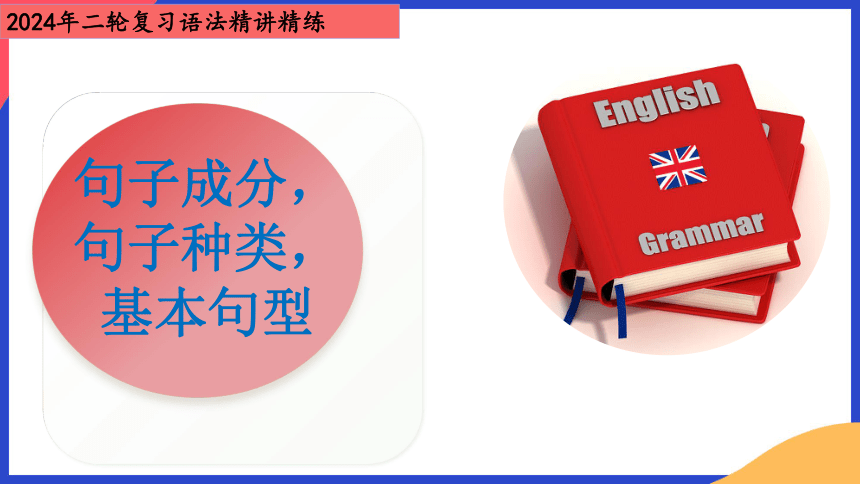 | |
| 格式 | ppt | ||
| 文件大小 | 3.0MB | ||
| 资源类型 | 试卷 | ||
| 版本资源 | 通用版 | ||
| 科目 | 英语 | ||
| 更新时间 | 2024-04-24 12:32:32 | ||
图片预览


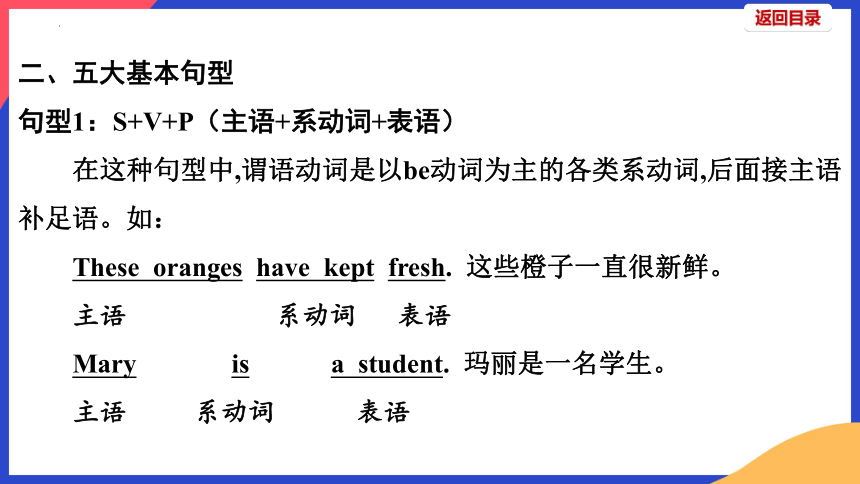
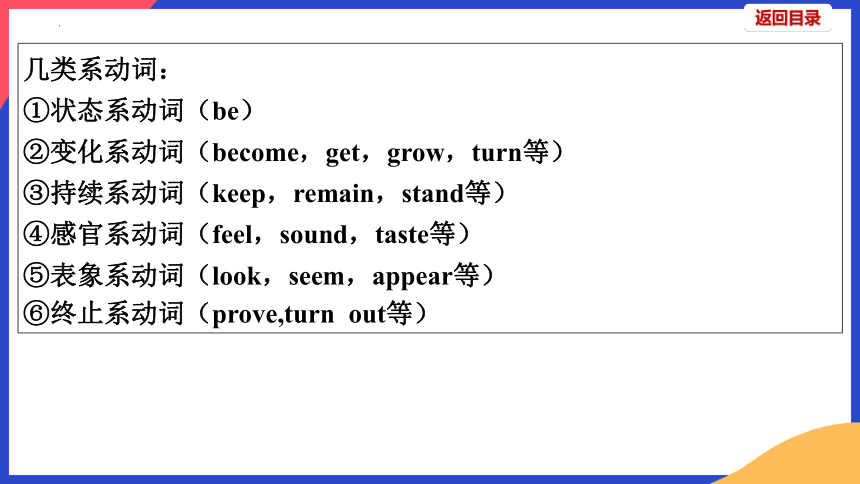
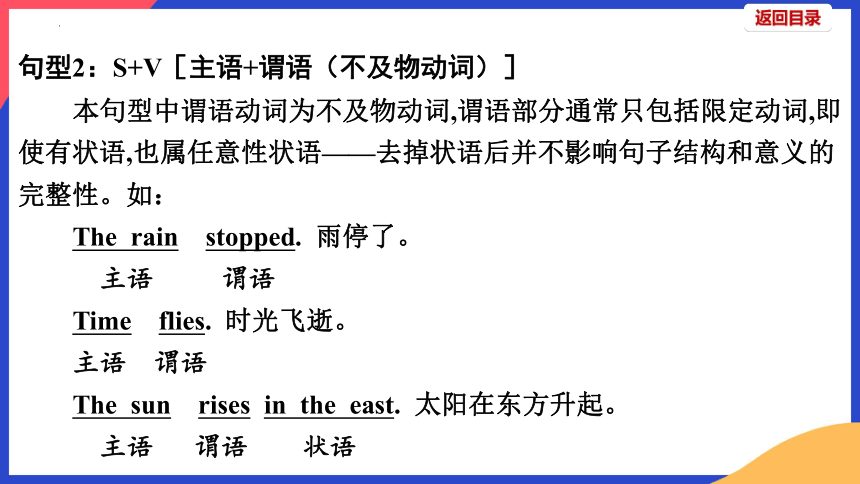
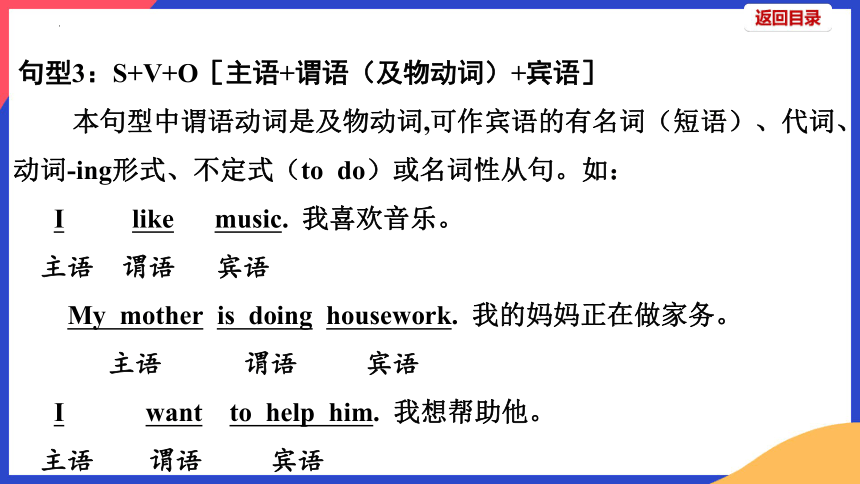
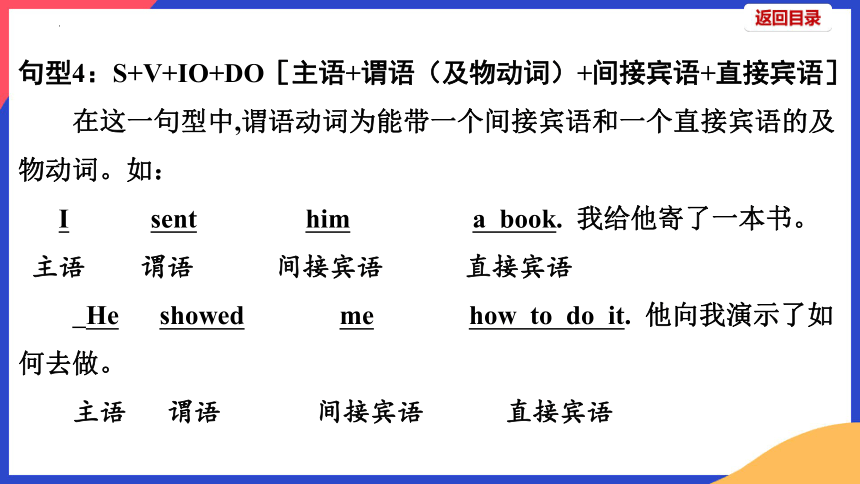

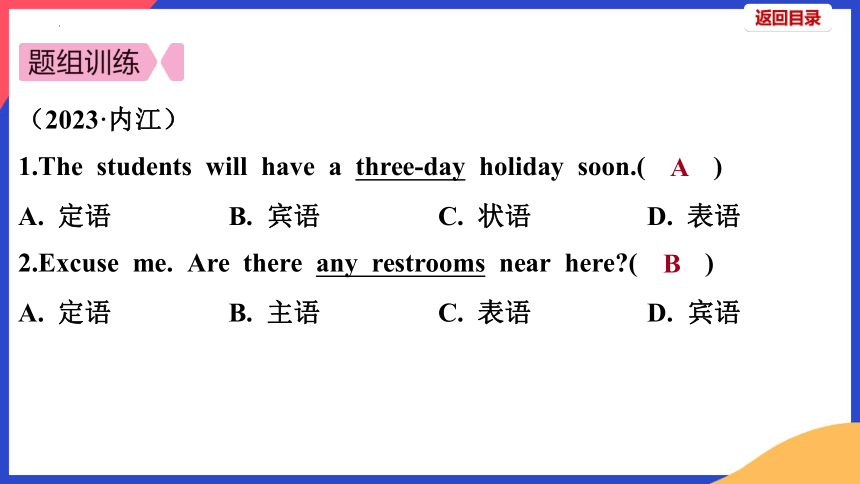
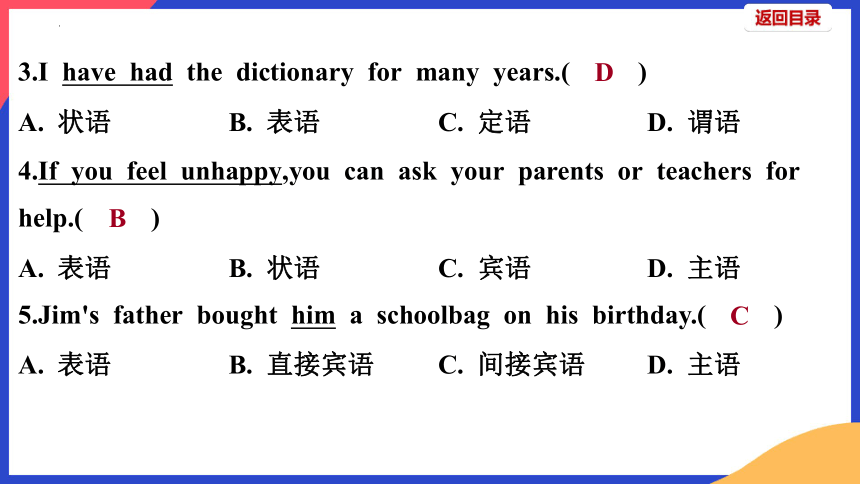
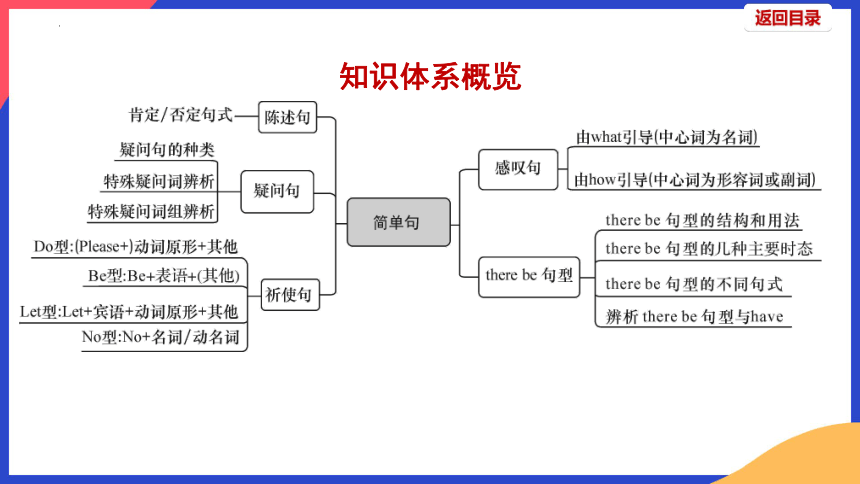

文档简介
(共65张PPT)
导师:稻壳儿
2024年二轮复习语法精讲精练
句子成分,
句子种类,
基本句型
一、句子成分
二、五大基本句型
句型1:S+V+P(主语+系动词+表语)
在这种句型中,谓语动词是以be动词为主的各类系动词,后面接主语补足语。如:
These oranges have kept fresh. 这些橙子一直很新鲜。
主语 系动词 表语
Mary is a student. 玛丽是一名学生。
主语 系动词 表语
几类系动词:
①状态系动词(be)
②变化系动词(become,get,grow,turn等)
③持续系动词(keep,remain,stand等)
④感官系动词(feel,sound,taste等)
⑤表象系动词(look,seem,appear等)
⑥终止系动词(prove,turn out等)
句型2:S+V[主语+谓语(不及物动词)]
本句型中谓语动词为不及物动词,谓语部分通常只包括限定动词,即使有状语,也属任意性状语——去掉状语后并不影响句子结构和意义的完整性。如:
The rain stopped. 雨停了。
主语 谓语
Time flies. 时光飞逝。
主语 谓语
The sun rises in the east. 太阳在东方升起。
主语 谓语 状语
句型3:S+V+O[主语+谓语(及物动词)+宾语]
本句型中谓语动词是及物动词,可作宾语的有名词(短语)、代词、动词-ing形式、不定式(to do)或名词性从句。如:
I like music. 我喜欢音乐。
主语 谓语 宾语
My mother is doing housework. 我的妈妈正在做家务。
主语 谓语 宾语
I want to help him. 我想帮助他。
主语 谓语 宾语
句型4:S+V+IO+DO[主语+谓语(及物动词)+间接宾语+直接宾语]
在这一句型中,谓语动词为能带一个间接宾语和一个直接宾语的及物动词。如:
I sent him a book. 我给他寄了一本书。
主语 谓语 间接宾语 直接宾语
. .He showed me how to do it. 他向我演示了如何去做。
主语 谓语 间接宾语 直接宾语
句型5:S+V+O+OC[主语+谓语(及物动词)+宾语+宾语补足语]
在这种句型中,谓语动词为能带复合宾语(宾语+宾语补足语)的及物动词。如:
We named our baby Tom. 我们给我们的孩子取名叫汤姆。
主语 谓语 宾语 宾语补足语
He painted the wall white. 他把墙刷成了白色。
主语 谓语 宾语 宾语补足语
(2023·内江)
1.The students will have a three-day holiday soon.( )
A
A. 定语 B. 宾语 C. 状语 D. 表语
2.Excuse me. Are there any restrooms near here ( )
B
A. 定语 B. 主语 C. 表语 D. 宾语
3.I have had the dictionary for many years.( )
D
A. 状语 B. 表语 C. 定语 D. 谓语
4.If you feel unhappy,you can ask your parents or teachers for
help.( )
B
A. 表语 B. 状语 C. 宾语 D. 主语
5.Jim's father bought him a schoolbag on his birthday.( )
C
A. 表语 B. 直接宾语 C. 间接宾语 D. 主语
知识体系概览
中考考点透视
&1& 陈述句
◆陈述句的肯定句式:主语+谓语(+其他)
如:Among all the subjects,I love history best.在所有的科目中,我最喜欢历史。
◆陈述句的否定句式:“主语+be动词+not(+其他)”或“主语+助动词/情态动词+not+实义动词+(其他)”
(1)如果句子的谓语是be动词,在其后加not,常用其缩略形式。
(2)如果句子的谓语是实义动词,在实义动词前要用助动词或情态动词的否定形式,如: won't,don't,doesn't,didn't,haven't,hasn't 等。
(3)含有否定意义的词也可以构成陈述句的否定形式,如: no,hardly,never,seldom,nothing,none,nobody等。
(4)在某些句子中,按语义本来应当放在that从句中的否定词not被前移至主句的谓语中,叫作“否定转移”。这种否定结构主要用于由表示“相信;猜测”的动词构成的主从复合句中。如:believe,expect,imagine,suppose,think等。
1.Yukio doesn't watch any TV shows on Monday.(改为肯定句)
Yukio ________ ______ TV shows on Monday.
2.I used to read English books after dinner.(改为否定句)
I _______ _____________ to read English books after dinner.
3.Kids will study at home on computers.(改为否定句)
Kids _____ ____ study at home on computers.
watches
some
didn't
use/used not
will
not
&2& 疑问句
◆疑问句的种类
类别 结构 例句
一般
疑问
句 Be动词+主语+其
他? Is this your pencil 这是你的铅笔吗?
【七上Unit 3第13页】
情态动词+主语+动
词原形+其他? Can you swim 你会游泳吗?【七下Unit
1第1页】
助动词+主语+动词
原形+其他 Did you go to the movies yesterday 你
昨天去看电影了吗?
类别 结构 例句
特殊
疑问
句 特殊疑问词(组)
+一般疑问句? Why does Bob like history 为什么鲍勃
喜欢历史?【七上Unit 9第51页】
选择
疑问
句 一般疑问句+or+另
一个备选对象 —Do they have straight or curly hair
他们留着直发还是卷发?
—They have curly hair.他们留着卷发。
【七下Unit 9第51页】
特殊疑问句+or+另
一个备选对象
续表
类别 结构 例句
反意
疑问
句 陈述句/祈使句+简
短问句 —You used to be short,didn't you 你过
去长得矮,是吗?
—Yes,I did.是的。/No,I didn't.不是的。
【九全Unit 4第28页】
续表
◆特殊疑问词辨析
特殊疑问词 用法 特殊疑问词 用法
who 询问身份 when 询问时间
which 询问特定的人或物
(有选择) why 询问原因
what 询问职业或身份
(无选择) where 询问地点、位
置
whose 询问所属关系 how 询问方式
◆特殊疑问词组辨析
词组 意义及用法 词组 意义及用法
how long 多长(时间)[提
问(时间)长短] how wide 多宽(提问宽
度)
how often 多久一次(提问频
率) how tall/high 多高(提问高
度)
how soon 多久以后(提问in
短语) how old 多大(提问年
龄)
how many 多少(提问可数名
词的量) what size 什么尺寸(提
问尺寸)
词组 意义及用法 词组 意义及用法
how much 多少(钱)(提问
不可数名词的量或
价格) what color 什么颜色(提
问颜色)
how far 多远(提问距离) what time 什么时候(提
问时间点)
how heavy 多重(提问重量)
续表
1.(2023·武威)—___ do you learn these words by heart
—By using them in different ways.
B
A. When B. How C. Why D. Where
2.(2023·龙东改编)—You haven't visited the Palace Museum,have
you
—___.How I wish to visit it some day!
A
A. No,I haven't B. Yes,I haven't C. Yes,I have D. No,I have
3.(2023·连云港)—___ have you been a member of the Youth
League
—For three years.
A
A. How long B. How many C. How often D. How far
4.(2022·阜新)—___ do you volunteer in the care home
—Once a week.
D
A. How far B. How many C. How much D. How often
5.—______ was the weather yesterday
—It was sunny and warm.
6.—It is rude to ask direct questions,________?
—Yes,but I think it's OK to your close friends.
How
isn't it
&3& 祈使句
结构 例句(肯定形式) 例句(否定形式)
Do型:
(Please+)动
词原形+其他 Please sit down!请坐
下!
Pour the milk into
the blender.将牛奶倒
入搅拌器。【八上
Unit 8 第57页】 Don't stand up!不要站起
来!
Don't arrive late for class.
上课不要迟到。
【七下Unit 4第19页】
结构 例句(肯定形式) 例句(否定形式)
Be型:Be+表语
(+其他) Be quiet!请安静! Don't be late for class.上课
不要迟到。
Let型:Let+宾语
+动词原形+其
他 Let's have another
try!咱们再试一次
吧! Don't let the boy draw
here./Let the boy not draw
here.让那个男孩不要在这里
画画。
No型: No+名词
/动名词 No litter!禁止扔垃圾!
No parking!禁止停车!
续表
结构 例句(肯定形式) 例句(否定形式)
注意:
(1)祈使句的答语有“OK,I/we will.” “Sorry,I/we won't.”
(2)祈使句与if条件句的转换:①祈使句+and+句子=If 条件句+句
子 ②祈使句+or+句子=If…not…+句子
续表
1.(2023·武威)___ trying and do your best.
A
A. Keep B. Keeping C. To keep D. Kept
2.(2022·遂宁)—Sam,___ run in the hallways. It's very dangerous.
—Sorry,Ms. Black.
B
A. do B. don't C. not D. doesn't
3.(2021·北部湾)—___ here,please.
—Sorry,I will move the car away right now.
D
A. No swimming B. No smoking C. No eating D. No parking
4.Young man,______ sit there daydreaming. No one can achieve
anything without effort.
5.Hurry up,____ you will miss the bus.= ___ you don't hurry
up,you will miss the bus.
don't
or
If
&4& 感叹句
感叹句用来表示喜、怒、哀、乐等感情,通常用what或how引导。what与how的选择方法:
◆感叹句的结构
引导词 结构 例句
what What+a/an+形容词+可数名
词单数(+主语+谓语)! What a beautiful present (it
is)!多么漂亮的一件礼物啊!
What+形容词+可数名词复
数(+主语+谓语)! What lovely boys (they
are)!多么可爱的男孩啊!
What+形容词+不可数名词
(+主语+谓语)! What nice music (it is)!多
么美妙的音乐啊!
引导词 结构 例句
how How+形容词/副词+主语+谓
语! How pretty the dragon boats
were!多么漂亮的龙舟啊!
【九全Unit 2第12页】
How+形容词+a/an/the+可
数名词单数(+主语+谓
语)! How beautiful a present (it
is)!多么漂亮的一件礼物啊!
How+主语+谓语! How time flies!时间过得多快
呀!
续表
1.(2023·株洲改编)—___ clean the classroom is!
—So it is. The students clean it every day.
A
A. How B. What C. What a D. How a
2.(2023·凉山州改编)___ beautiful day!Let's take a walk by the
lake.
B
A. What B. What a C. How D. How a
3.(2023·吉林改编)___ interesting movie it is!I want to see it
again.
B
A. What B. What an C. How D. How an
4.(2023·营口)___ useful knowledge the astronaut in Tiangong
Classroom has taught us!
B
A. How B. What C. How a D. What a
5.______ cute and lovely the babies are!I will take care of them
like they're my own babies.
How
6.—______ a terrible mess you have made!
—Sorry,Mom. I will clear it up right now.
What
&5& there be句型
◆there be句型的结构和用法
(1)结构:there be句型的结构为“There+be动词+主语(人或物)+地点状语/时间状语”,表示“某处(或某时)有某人(或某物)”。
(2)用法:be动词必须和主语在人称和单复数形式上保持一致,即遵循“就近原则”。如果主语部分是两个或两个以上的并列主语时,be动词一般和邻近主语在人称和单复数形式上保持一致。如:
There is a desk and five chairs.那里有一张桌子和五把椅子。
There are five chairs and a desk.那里有五把椅子和一张桌子。
◆there be句型的几种主要时态
时态 there be句型 例句
一般
现在
时 There
is/are… There is a boy waiting for you outside.外面
有个男孩在等你。
一般
过去
时 There
was/were… I called you yesterday evening,but there
was no answer.昨天晚上我打电话给你了,但
是没人接。
时态 there be句型 例句
一般
将来
时 There will
be…
There is/are
going to be… There will be an English speech competition
in our school next Monday.下周一我们学校
将举行英语演讲比赛。
现在
完成
时 There
have/has
been… There have been great changes in Kunming
in the past few years.在过去的几年里,昆明
发生了很大的变化。
续表
◆there be句型的不同句式
(1)否定句:be动词后加not,no或not any。如:
There is no such thing as true failure.没有真正的失败。
(2)一般疑问句:be动词提到句首。如:
Is there life on other planets 其他星球上有生命吗
◆辨析there be句型与have
(1)there be句型表示某处存在某物或某人,不强调此物归谁所有;have表示某人拥有某物或某人,强调所有、拥有关系。如:
There is a mountain in the small village.这个小村庄里有一座山。
I have a good friend.我有一个好朋友。
(2)当have意为“包括;存在”时,可以与there be句型互换。如:
A year has four seasons.=There are four seasons in a year.一年有四个季节。
1.(2022·贵港)—There ___ a talk by Zhong Nanshan in our
school tomorrow afternoon.
—Great!We can't wait!
C
A. is B. was C. will be D. will have
2.If there ___ no buying and selling of animals,there will be no
killing in nature.
A
A. is B. will be C. has D. will have
3.—Excuse me,are there any bookstores around here
—___,but there are some on Center Street.
B
A. Yes,there are B. No,there aren't
C. Yes,there is D. No,there isn't
4.—Mom,___ there any bread at home?
—Yes. Open the fridge and you'll see it.
5._______ is a teacher and some students playing soccer on the
playground.
is
There
考点提分训练
一、单项选择。
1.(2023·绥化改编)—Our school volleyball team won the first
prize last Friday.
—Wow,___ great news!
C
A. how B. what a C. what D. how a
2.(2023·武威)There ___ a big tree behind the shop. You can see
many birds in it.
A
A. is B. are C. was D. were
3.(2023·武威)—___ do you exercise
—Every day.
D
A. How many B. How old C. How much D. How often
4.(2023·无锡)___ is your hometown I can't find it anywhere
on the map.
D
A. What B. Which C. When D. Where
5.(2023·吉林改编)—___ is it from our school to the new
bookstore,Li Lei
—Only one kilometer.
A
A. How far B. How long C. How soon D. How much
6.—Listen!Ms. Lu is telling us the importance of learning English
again and again.
—___ teacher she is!We must study harder.
D
A. How patient B. What patient
C. How a patient D. What a patient
7.—________ Mary have long ________ short hair
—She has long hair.( )
B
A. Does;and B. Does;or C. Is;or D. Is;and
8.—Isn't he going to join us this evening
—___.He has too much homework to do.
D
A. Yes,he will B. Yes,he is C. No,he won't D. No,he isn't
9.—___ will your English teacher come back from Shanghai
—In two weeks.
B
A. How often B. How soon C. How far D. How long
10.—Mom,can I go out with my friends
—___ your homework first. Then I will think about it.
A
A. Finish B. Finishing C. To finish D. Finished
二、根据句意在空白处填入一个适当的单词。
11.He has good grades in all subjects,________ he
12.______ a useful robot! It can help with the housework like a
human servant.
13.—______ heavy the bag is!I can't move it at all.
—Don't worry!Let me help you.
doesn't
What
How
14.—_______ will be an English show this weekend. Shall we go
and watch it
—Sure,no problem.
There
【考点抢测】
1.—What a fine day!Let’s go for a picnic, _____?
—Sounds like a good idea.
A. shall we B. don’t we C. can we D. do we
A
2.Tom hardly eats breakfast, _____?
A. isn’t he B. is he C. doesn’t he D. does he
D
3.—It’s Father’s Day, _____?
—Yes. Let’s buy a gift for dad.He works very hard for us.
A. isn’t it B. doesn’t it C. isn’t he D. doesn’t he
A
4._____ do people greet visitors? Some shake hands. Some say “hello” or “hi”.Some kiss.
A. Why B. What C. How D. Why
5.—I can’t find my pen._____ you __ it anywhere, Mum
—No.Look! What’s that under your book
A.Have; seen
B.Were; seeing
C.Does; see
D.Had; seen
A
C
6.—_____ I go and meet you at the airport
—No, thanks, dear.I can take a taxi home.
A. Will B. Do C. Shall D. Should
7.—Mike, _____ do you have a health examination?
—Once a year.
A. how long B. how many C. how much D. how often
D
8.—_____ dictionary is this It’s very nice.
—I think it’s Mary’s.
A. Who B. Whose C. Whom D. What
B
C
9.—_____ is it from Lanzhou to Lasa
—It’s about 2,160 kilometers.
A. How often B. How far C. How long D. How many
B
【考点抢测】
1.—_____ rapid progress our country is making in science and technology!
—So it is. We are enjoying the convenience of modern technology.
A. How B. What C. What a D. What an
B
2.—_____ wonderful the music is!
—Yes. It makes me relaxed after a busy day.
A. How B. What a C. How a D. What
A
3.—_____ terrible mess you have made!
—Sorry, Mum. I will clear it up right now.
A. What a B. What C. How D. What an
A
4.—Wear your mask before going out.
—_____.
A. OK B. OK, I won’t C. Good luck D. With pleasure
A
5._____ the rubbish here and there, OK
A. Not throw B. Don’t throw C. Be not throwing D. Not to throw
B
6.—Never touch my things again!
—_____.
A. You are kidding B. You’re so serious
C. I won’t do that D. I’m afraid not
C
7.—Let’s go to the central park and take the Ferris Wheel (摩天轮) to enjoy the view of the city.
—_____ interesting idea!
A. What B. How C. What an D. How an
C
8.—Steven, did you see the lantern show when you were here last month
—Of course! _____ beautiful lanterns!
A. How B. What C. What a D. What an
B
考点四 特殊句型
1.There be 句型
分类 结构 例句
肯定句 There be+主语+其他. There are two birds in the tree.
否定句 There be+not+主语+其他. There is no milk in the fridge.
一般疑问句及回答 Be there+主语+其他?Yes,there+be./No,there+be+not. —Are there some pens in your bag
—Yes,there are./No,there aren’t.
特殊疑问句 ①How many/much对数量提问
②What对主语提问(常省略there) How many people are there in your family
How much milk is there in the cup What’s in the desk
温馨提示
①当there be句型中有两个或多个并列主语时,be动词的形式应与靠它最近的主语保持一致,即“就近原则”。
②there be句型中的be也可用lie,stand,exist等词代替。
③there be句型有时态变化,体现在be有形式变化上。
④句型“There be+主语+doing sth.+其他.”表示“有某人/某物正在做某事。”
there be结构译为“有”,be后跟着名词走。
单数主语用is,复数用are记清楚。
并列主语特殊记,“就近原则”莫忘记。
否定be后not添,疑问将be放在前。
肯定句中用some,疑问否定换any。
1.(2021,毕节)—Mike, _____ play football in the street next time.It’s dangerous.
—OK, I won’t do that again, mom.
A. mustn’t B. must C. don’t D. do
C
2.(2021,梧州)—_____ your hands before dinner, Tony.
—No problem, Mom.
A. Wash B. Washes C. Washing D. To wash
A
3.(2021,襄阳)—_____ nice weather it is to go hiking! Would you like to go with me
—Good idea! Let’s go.
A. How a B. How C. What a D. What
4.(2021,营口)—I will go swimming this afternoon, Daming.
—If you go, so _____ I.
A. will B. do C. am D. have
A
5.(2021,北京)—_____ shall we meet for the picnic?
—At the school gate.
A. How B. When C. Why D. Where
D
D
6.(2021,扬州)—_____ do you play basketball with your friends?
—Only once a week.
A. How long B. How much C. How soon D. How often
7.(2021,营口)One thousand kilometers _____ quite a long way to the ancient, but now we can complete the journey in about one hour by air.
A. was B. had C. were D. have
A
8.Jack, you are going to the mountain village to help the children, _____?
A. don’t you B. do you C. aren’t you D. are you
C
9.Let’s meet at the school gate, _____?
A. shall we B. shall you C. will we D. will you
A
D
10.—_____ is it from Haikou to Sanya?
—It’s about three hours’ drive.
A. How soon B. How long C. How far
11._____ your smartphones, and read for at least 30 minutes,every day! You know,reading helps us to deepen our spiritual world.
A. Put away B. To put away C. Putting away
A
C
12.When I want to go out to play with my friends, my mother always says, “_____ at home.Don’t waste your time.”
A. Stay B. Stays C. To stay D. Staying
A
13._____ exciting news! The Chinese team successfully arrived at the peak of Qomolangma.
A. What B. What an C. How D. How an
A
14.—Chinese government has successfully stopped the virus from spreading in China.
—_____ proud we Chinese feel!
A. How a B. How C. What D. What a
B
15.—The little boy is only three years old, but he can memorize about 50 poems.
—_____ talented boy he is!
A. How B. How a C. What a D. What
C
16.—_____ did you celebrate the Dragon Boat Festival this year, Tom
—By making rice dumplings with my Chinese friends.
A. Where B. When C. How D. Why
C
17.Either you or I _____ invited to the important meeting.
A. be B. is C. am D. are
C
18.Not only Sam but also his parents _____ coming to China soon.
A. is B. are C. were
B
B
19.Spending time with families _____ the happiest thing.
A. are B. is C. be
20.—I’m getting hungry.Do you know where we can get some good food
—Of course!There _____ a restaurant around the corner.
A. will be B. was C. is
C
21.—What does he say
—He says there _____ a meeting tomorrow morning.
A. is B. has C. will be D. have
C
22.There _____ a number of books in the library and the number of them __ increasing.
A.has; is
B.have; are
C.is; are
D.are; is
23.—Excuse me.Is there a bank near here
—_____.It’s just between my house and a post office.
A. Yes, it is B. No, there isn’t C. Yes, there is D. No, it isn’t
C
D
24.—There is little money for Mr. Lee to buy a ticket for today’s show, _____
—Exactly!
A. are there B. isn’t there C. aren’t there D. is there
D
25.—I don’t like horror films.They’re terrible.
—_____.
A. Either I do B. Neither I do C. Either do I D. Neither do I
D
导师:稻壳儿
2024年二轮复习语法精讲精练
句子成分,
句子种类,
基本句型
一、句子成分
二、五大基本句型
句型1:S+V+P(主语+系动词+表语)
在这种句型中,谓语动词是以be动词为主的各类系动词,后面接主语补足语。如:
These oranges have kept fresh. 这些橙子一直很新鲜。
主语 系动词 表语
Mary is a student. 玛丽是一名学生。
主语 系动词 表语
几类系动词:
①状态系动词(be)
②变化系动词(become,get,grow,turn等)
③持续系动词(keep,remain,stand等)
④感官系动词(feel,sound,taste等)
⑤表象系动词(look,seem,appear等)
⑥终止系动词(prove,turn out等)
句型2:S+V[主语+谓语(不及物动词)]
本句型中谓语动词为不及物动词,谓语部分通常只包括限定动词,即使有状语,也属任意性状语——去掉状语后并不影响句子结构和意义的完整性。如:
The rain stopped. 雨停了。
主语 谓语
Time flies. 时光飞逝。
主语 谓语
The sun rises in the east. 太阳在东方升起。
主语 谓语 状语
句型3:S+V+O[主语+谓语(及物动词)+宾语]
本句型中谓语动词是及物动词,可作宾语的有名词(短语)、代词、动词-ing形式、不定式(to do)或名词性从句。如:
I like music. 我喜欢音乐。
主语 谓语 宾语
My mother is doing housework. 我的妈妈正在做家务。
主语 谓语 宾语
I want to help him. 我想帮助他。
主语 谓语 宾语
句型4:S+V+IO+DO[主语+谓语(及物动词)+间接宾语+直接宾语]
在这一句型中,谓语动词为能带一个间接宾语和一个直接宾语的及物动词。如:
I sent him a book. 我给他寄了一本书。
主语 谓语 间接宾语 直接宾语
. .He showed me how to do it. 他向我演示了如何去做。
主语 谓语 间接宾语 直接宾语
句型5:S+V+O+OC[主语+谓语(及物动词)+宾语+宾语补足语]
在这种句型中,谓语动词为能带复合宾语(宾语+宾语补足语)的及物动词。如:
We named our baby Tom. 我们给我们的孩子取名叫汤姆。
主语 谓语 宾语 宾语补足语
He painted the wall white. 他把墙刷成了白色。
主语 谓语 宾语 宾语补足语
(2023·内江)
1.The students will have a three-day holiday soon.( )
A
A. 定语 B. 宾语 C. 状语 D. 表语
2.Excuse me. Are there any restrooms near here ( )
B
A. 定语 B. 主语 C. 表语 D. 宾语
3.I have had the dictionary for many years.( )
D
A. 状语 B. 表语 C. 定语 D. 谓语
4.If you feel unhappy,you can ask your parents or teachers for
help.( )
B
A. 表语 B. 状语 C. 宾语 D. 主语
5.Jim's father bought him a schoolbag on his birthday.( )
C
A. 表语 B. 直接宾语 C. 间接宾语 D. 主语
知识体系概览
中考考点透视
&1& 陈述句
◆陈述句的肯定句式:主语+谓语(+其他)
如:Among all the subjects,I love history best.在所有的科目中,我最喜欢历史。
◆陈述句的否定句式:“主语+be动词+not(+其他)”或“主语+助动词/情态动词+not+实义动词+(其他)”
(1)如果句子的谓语是be动词,在其后加not,常用其缩略形式。
(2)如果句子的谓语是实义动词,在实义动词前要用助动词或情态动词的否定形式,如: won't,don't,doesn't,didn't,haven't,hasn't 等。
(3)含有否定意义的词也可以构成陈述句的否定形式,如: no,hardly,never,seldom,nothing,none,nobody等。
(4)在某些句子中,按语义本来应当放在that从句中的否定词not被前移至主句的谓语中,叫作“否定转移”。这种否定结构主要用于由表示“相信;猜测”的动词构成的主从复合句中。如:believe,expect,imagine,suppose,think等。
1.Yukio doesn't watch any TV shows on Monday.(改为肯定句)
Yukio ________ ______ TV shows on Monday.
2.I used to read English books after dinner.(改为否定句)
I _______ _____________ to read English books after dinner.
3.Kids will study at home on computers.(改为否定句)
Kids _____ ____ study at home on computers.
watches
some
didn't
use/used not
will
not
&2& 疑问句
◆疑问句的种类
类别 结构 例句
一般
疑问
句 Be动词+主语+其
他? Is this your pencil 这是你的铅笔吗?
【七上Unit 3第13页】
情态动词+主语+动
词原形+其他? Can you swim 你会游泳吗?【七下Unit
1第1页】
助动词+主语+动词
原形+其他 Did you go to the movies yesterday 你
昨天去看电影了吗?
类别 结构 例句
特殊
疑问
句 特殊疑问词(组)
+一般疑问句? Why does Bob like history 为什么鲍勃
喜欢历史?【七上Unit 9第51页】
选择
疑问
句 一般疑问句+or+另
一个备选对象 —Do they have straight or curly hair
他们留着直发还是卷发?
—They have curly hair.他们留着卷发。
【七下Unit 9第51页】
特殊疑问句+or+另
一个备选对象
续表
类别 结构 例句
反意
疑问
句 陈述句/祈使句+简
短问句 —You used to be short,didn't you 你过
去长得矮,是吗?
—Yes,I did.是的。/No,I didn't.不是的。
【九全Unit 4第28页】
续表
◆特殊疑问词辨析
特殊疑问词 用法 特殊疑问词 用法
who 询问身份 when 询问时间
which 询问特定的人或物
(有选择) why 询问原因
what 询问职业或身份
(无选择) where 询问地点、位
置
whose 询问所属关系 how 询问方式
◆特殊疑问词组辨析
词组 意义及用法 词组 意义及用法
how long 多长(时间)[提
问(时间)长短] how wide 多宽(提问宽
度)
how often 多久一次(提问频
率) how tall/high 多高(提问高
度)
how soon 多久以后(提问in
短语) how old 多大(提问年
龄)
how many 多少(提问可数名
词的量) what size 什么尺寸(提
问尺寸)
词组 意义及用法 词组 意义及用法
how much 多少(钱)(提问
不可数名词的量或
价格) what color 什么颜色(提
问颜色)
how far 多远(提问距离) what time 什么时候(提
问时间点)
how heavy 多重(提问重量)
续表
1.(2023·武威)—___ do you learn these words by heart
—By using them in different ways.
B
A. When B. How C. Why D. Where
2.(2023·龙东改编)—You haven't visited the Palace Museum,have
you
—___.How I wish to visit it some day!
A
A. No,I haven't B. Yes,I haven't C. Yes,I have D. No,I have
3.(2023·连云港)—___ have you been a member of the Youth
League
—For three years.
A
A. How long B. How many C. How often D. How far
4.(2022·阜新)—___ do you volunteer in the care home
—Once a week.
D
A. How far B. How many C. How much D. How often
5.—______ was the weather yesterday
—It was sunny and warm.
6.—It is rude to ask direct questions,________?
—Yes,but I think it's OK to your close friends.
How
isn't it
&3& 祈使句
结构 例句(肯定形式) 例句(否定形式)
Do型:
(Please+)动
词原形+其他 Please sit down!请坐
下!
Pour the milk into
the blender.将牛奶倒
入搅拌器。【八上
Unit 8 第57页】 Don't stand up!不要站起
来!
Don't arrive late for class.
上课不要迟到。
【七下Unit 4第19页】
结构 例句(肯定形式) 例句(否定形式)
Be型:Be+表语
(+其他) Be quiet!请安静! Don't be late for class.上课
不要迟到。
Let型:Let+宾语
+动词原形+其
他 Let's have another
try!咱们再试一次
吧! Don't let the boy draw
here./Let the boy not draw
here.让那个男孩不要在这里
画画。
No型: No+名词
/动名词 No litter!禁止扔垃圾!
No parking!禁止停车!
续表
结构 例句(肯定形式) 例句(否定形式)
注意:
(1)祈使句的答语有“OK,I/we will.” “Sorry,I/we won't.”
(2)祈使句与if条件句的转换:①祈使句+and+句子=If 条件句+句
子 ②祈使句+or+句子=If…not…+句子
续表
1.(2023·武威)___ trying and do your best.
A
A. Keep B. Keeping C. To keep D. Kept
2.(2022·遂宁)—Sam,___ run in the hallways. It's very dangerous.
—Sorry,Ms. Black.
B
A. do B. don't C. not D. doesn't
3.(2021·北部湾)—___ here,please.
—Sorry,I will move the car away right now.
D
A. No swimming B. No smoking C. No eating D. No parking
4.Young man,______ sit there daydreaming. No one can achieve
anything without effort.
5.Hurry up,____ you will miss the bus.= ___ you don't hurry
up,you will miss the bus.
don't
or
If
&4& 感叹句
感叹句用来表示喜、怒、哀、乐等感情,通常用what或how引导。what与how的选择方法:
◆感叹句的结构
引导词 结构 例句
what What+a/an+形容词+可数名
词单数(+主语+谓语)! What a beautiful present (it
is)!多么漂亮的一件礼物啊!
What+形容词+可数名词复
数(+主语+谓语)! What lovely boys (they
are)!多么可爱的男孩啊!
What+形容词+不可数名词
(+主语+谓语)! What nice music (it is)!多
么美妙的音乐啊!
引导词 结构 例句
how How+形容词/副词+主语+谓
语! How pretty the dragon boats
were!多么漂亮的龙舟啊!
【九全Unit 2第12页】
How+形容词+a/an/the+可
数名词单数(+主语+谓
语)! How beautiful a present (it
is)!多么漂亮的一件礼物啊!
How+主语+谓语! How time flies!时间过得多快
呀!
续表
1.(2023·株洲改编)—___ clean the classroom is!
—So it is. The students clean it every day.
A
A. How B. What C. What a D. How a
2.(2023·凉山州改编)___ beautiful day!Let's take a walk by the
lake.
B
A. What B. What a C. How D. How a
3.(2023·吉林改编)___ interesting movie it is!I want to see it
again.
B
A. What B. What an C. How D. How an
4.(2023·营口)___ useful knowledge the astronaut in Tiangong
Classroom has taught us!
B
A. How B. What C. How a D. What a
5.______ cute and lovely the babies are!I will take care of them
like they're my own babies.
How
6.—______ a terrible mess you have made!
—Sorry,Mom. I will clear it up right now.
What
&5& there be句型
◆there be句型的结构和用法
(1)结构:there be句型的结构为“There+be动词+主语(人或物)+地点状语/时间状语”,表示“某处(或某时)有某人(或某物)”。
(2)用法:be动词必须和主语在人称和单复数形式上保持一致,即遵循“就近原则”。如果主语部分是两个或两个以上的并列主语时,be动词一般和邻近主语在人称和单复数形式上保持一致。如:
There is a desk and five chairs.那里有一张桌子和五把椅子。
There are five chairs and a desk.那里有五把椅子和一张桌子。
◆there be句型的几种主要时态
时态 there be句型 例句
一般
现在
时 There
is/are… There is a boy waiting for you outside.外面
有个男孩在等你。
一般
过去
时 There
was/were… I called you yesterday evening,but there
was no answer.昨天晚上我打电话给你了,但
是没人接。
时态 there be句型 例句
一般
将来
时 There will
be…
There is/are
going to be… There will be an English speech competition
in our school next Monday.下周一我们学校
将举行英语演讲比赛。
现在
完成
时 There
have/has
been… There have been great changes in Kunming
in the past few years.在过去的几年里,昆明
发生了很大的变化。
续表
◆there be句型的不同句式
(1)否定句:be动词后加not,no或not any。如:
There is no such thing as true failure.没有真正的失败。
(2)一般疑问句:be动词提到句首。如:
Is there life on other planets 其他星球上有生命吗
◆辨析there be句型与have
(1)there be句型表示某处存在某物或某人,不强调此物归谁所有;have表示某人拥有某物或某人,强调所有、拥有关系。如:
There is a mountain in the small village.这个小村庄里有一座山。
I have a good friend.我有一个好朋友。
(2)当have意为“包括;存在”时,可以与there be句型互换。如:
A year has four seasons.=There are four seasons in a year.一年有四个季节。
1.(2022·贵港)—There ___ a talk by Zhong Nanshan in our
school tomorrow afternoon.
—Great!We can't wait!
C
A. is B. was C. will be D. will have
2.If there ___ no buying and selling of animals,there will be no
killing in nature.
A
A. is B. will be C. has D. will have
3.—Excuse me,are there any bookstores around here
—___,but there are some on Center Street.
B
A. Yes,there are B. No,there aren't
C. Yes,there is D. No,there isn't
4.—Mom,___ there any bread at home?
—Yes. Open the fridge and you'll see it.
5._______ is a teacher and some students playing soccer on the
playground.
is
There
考点提分训练
一、单项选择。
1.(2023·绥化改编)—Our school volleyball team won the first
prize last Friday.
—Wow,___ great news!
C
A. how B. what a C. what D. how a
2.(2023·武威)There ___ a big tree behind the shop. You can see
many birds in it.
A
A. is B. are C. was D. were
3.(2023·武威)—___ do you exercise
—Every day.
D
A. How many B. How old C. How much D. How often
4.(2023·无锡)___ is your hometown I can't find it anywhere
on the map.
D
A. What B. Which C. When D. Where
5.(2023·吉林改编)—___ is it from our school to the new
bookstore,Li Lei
—Only one kilometer.
A
A. How far B. How long C. How soon D. How much
6.—Listen!Ms. Lu is telling us the importance of learning English
again and again.
—___ teacher she is!We must study harder.
D
A. How patient B. What patient
C. How a patient D. What a patient
7.—________ Mary have long ________ short hair
—She has long hair.( )
B
A. Does;and B. Does;or C. Is;or D. Is;and
8.—Isn't he going to join us this evening
—___.He has too much homework to do.
D
A. Yes,he will B. Yes,he is C. No,he won't D. No,he isn't
9.—___ will your English teacher come back from Shanghai
—In two weeks.
B
A. How often B. How soon C. How far D. How long
10.—Mom,can I go out with my friends
—___ your homework first. Then I will think about it.
A
A. Finish B. Finishing C. To finish D. Finished
二、根据句意在空白处填入一个适当的单词。
11.He has good grades in all subjects,________ he
12.______ a useful robot! It can help with the housework like a
human servant.
13.—______ heavy the bag is!I can't move it at all.
—Don't worry!Let me help you.
doesn't
What
How
14.—_______ will be an English show this weekend. Shall we go
and watch it
—Sure,no problem.
There
【考点抢测】
1.—What a fine day!Let’s go for a picnic, _____?
—Sounds like a good idea.
A. shall we B. don’t we C. can we D. do we
A
2.Tom hardly eats breakfast, _____?
A. isn’t he B. is he C. doesn’t he D. does he
D
3.—It’s Father’s Day, _____?
—Yes. Let’s buy a gift for dad.He works very hard for us.
A. isn’t it B. doesn’t it C. isn’t he D. doesn’t he
A
4._____ do people greet visitors? Some shake hands. Some say “hello” or “hi”.Some kiss.
A. Why B. What C. How D. Why
5.—I can’t find my pen._____ you __ it anywhere, Mum
—No.Look! What’s that under your book
A.Have; seen
B.Were; seeing
C.Does; see
D.Had; seen
A
C
6.—_____ I go and meet you at the airport
—No, thanks, dear.I can take a taxi home.
A. Will B. Do C. Shall D. Should
7.—Mike, _____ do you have a health examination?
—Once a year.
A. how long B. how many C. how much D. how often
D
8.—_____ dictionary is this It’s very nice.
—I think it’s Mary’s.
A. Who B. Whose C. Whom D. What
B
C
9.—_____ is it from Lanzhou to Lasa
—It’s about 2,160 kilometers.
A. How often B. How far C. How long D. How many
B
【考点抢测】
1.—_____ rapid progress our country is making in science and technology!
—So it is. We are enjoying the convenience of modern technology.
A. How B. What C. What a D. What an
B
2.—_____ wonderful the music is!
—Yes. It makes me relaxed after a busy day.
A. How B. What a C. How a D. What
A
3.—_____ terrible mess you have made!
—Sorry, Mum. I will clear it up right now.
A. What a B. What C. How D. What an
A
4.—Wear your mask before going out.
—_____.
A. OK B. OK, I won’t C. Good luck D. With pleasure
A
5._____ the rubbish here and there, OK
A. Not throw B. Don’t throw C. Be not throwing D. Not to throw
B
6.—Never touch my things again!
—_____.
A. You are kidding B. You’re so serious
C. I won’t do that D. I’m afraid not
C
7.—Let’s go to the central park and take the Ferris Wheel (摩天轮) to enjoy the view of the city.
—_____ interesting idea!
A. What B. How C. What an D. How an
C
8.—Steven, did you see the lantern show when you were here last month
—Of course! _____ beautiful lanterns!
A. How B. What C. What a D. What an
B
考点四 特殊句型
1.There be 句型
分类 结构 例句
肯定句 There be+主语+其他. There are two birds in the tree.
否定句 There be+not+主语+其他. There is no milk in the fridge.
一般疑问句及回答 Be there+主语+其他?Yes,there+be./No,there+be+not. —Are there some pens in your bag
—Yes,there are./No,there aren’t.
特殊疑问句 ①How many/much对数量提问
②What对主语提问(常省略there) How many people are there in your family
How much milk is there in the cup What’s in the desk
温馨提示
①当there be句型中有两个或多个并列主语时,be动词的形式应与靠它最近的主语保持一致,即“就近原则”。
②there be句型中的be也可用lie,stand,exist等词代替。
③there be句型有时态变化,体现在be有形式变化上。
④句型“There be+主语+doing sth.+其他.”表示“有某人/某物正在做某事。”
there be结构译为“有”,be后跟着名词走。
单数主语用is,复数用are记清楚。
并列主语特殊记,“就近原则”莫忘记。
否定be后not添,疑问将be放在前。
肯定句中用some,疑问否定换any。
1.(2021,毕节)—Mike, _____ play football in the street next time.It’s dangerous.
—OK, I won’t do that again, mom.
A. mustn’t B. must C. don’t D. do
C
2.(2021,梧州)—_____ your hands before dinner, Tony.
—No problem, Mom.
A. Wash B. Washes C. Washing D. To wash
A
3.(2021,襄阳)—_____ nice weather it is to go hiking! Would you like to go with me
—Good idea! Let’s go.
A. How a B. How C. What a D. What
4.(2021,营口)—I will go swimming this afternoon, Daming.
—If you go, so _____ I.
A. will B. do C. am D. have
A
5.(2021,北京)—_____ shall we meet for the picnic?
—At the school gate.
A. How B. When C. Why D. Where
D
D
6.(2021,扬州)—_____ do you play basketball with your friends?
—Only once a week.
A. How long B. How much C. How soon D. How often
7.(2021,营口)One thousand kilometers _____ quite a long way to the ancient, but now we can complete the journey in about one hour by air.
A. was B. had C. were D. have
A
8.Jack, you are going to the mountain village to help the children, _____?
A. don’t you B. do you C. aren’t you D. are you
C
9.Let’s meet at the school gate, _____?
A. shall we B. shall you C. will we D. will you
A
D
10.—_____ is it from Haikou to Sanya?
—It’s about three hours’ drive.
A. How soon B. How long C. How far
11._____ your smartphones, and read for at least 30 minutes,every day! You know,reading helps us to deepen our spiritual world.
A. Put away B. To put away C. Putting away
A
C
12.When I want to go out to play with my friends, my mother always says, “_____ at home.Don’t waste your time.”
A. Stay B. Stays C. To stay D. Staying
A
13._____ exciting news! The Chinese team successfully arrived at the peak of Qomolangma.
A. What B. What an C. How D. How an
A
14.—Chinese government has successfully stopped the virus from spreading in China.
—_____ proud we Chinese feel!
A. How a B. How C. What D. What a
B
15.—The little boy is only three years old, but he can memorize about 50 poems.
—_____ talented boy he is!
A. How B. How a C. What a D. What
C
16.—_____ did you celebrate the Dragon Boat Festival this year, Tom
—By making rice dumplings with my Chinese friends.
A. Where B. When C. How D. Why
C
17.Either you or I _____ invited to the important meeting.
A. be B. is C. am D. are
C
18.Not only Sam but also his parents _____ coming to China soon.
A. is B. are C. were
B
B
19.Spending time with families _____ the happiest thing.
A. are B. is C. be
20.—I’m getting hungry.Do you know where we can get some good food
—Of course!There _____ a restaurant around the corner.
A. will be B. was C. is
C
21.—What does he say
—He says there _____ a meeting tomorrow morning.
A. is B. has C. will be D. have
C
22.There _____ a number of books in the library and the number of them __ increasing.
A.has; is
B.have; are
C.is; are
D.are; is
23.—Excuse me.Is there a bank near here
—_____.It’s just between my house and a post office.
A. Yes, it is B. No, there isn’t C. Yes, there is D. No, it isn’t
C
D
24.—There is little money for Mr. Lee to buy a ticket for today’s show, _____
—Exactly!
A. are there B. isn’t there C. aren’t there D. is there
D
25.—I don’t like horror films.They’re terrible.
—_____.
A. Either I do B. Neither I do C. Either do I D. Neither do I
D
同课章节目录
